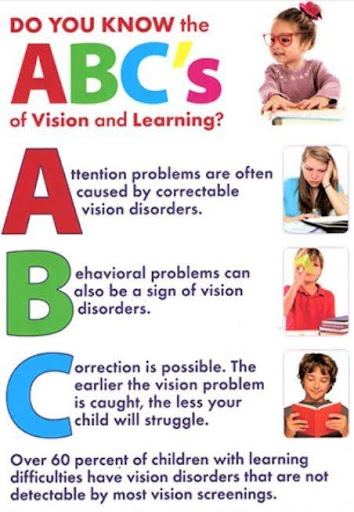Clear vision is key for kids to do well in all areas of life. Illinois has a law that requires children entering kindergarten or enrolling for the first time in public, private, or parochial schools to have a comprehensive eye examination by a licensed optometrist or ophthalmologist. Since eye-related disorders can be present from birth, vision screenings are recommended for kids of all ages, even babies.
If you notice anything unusual about your child's eyesight, the pediatric eye care team at Naper Grove Vision Care is equipped to diagnose, treat, and guide you on a range of concerns — be it something as common as a blocked tear duct or something rare like ocular melanoma (eye cancer). With offices located in both Naperville and Downer’s Grove, Naper Grove Vision Care is here to help.
Common Eye Conditions in Children

source
It’s estimated that 1 in every 4 children has some kind of vision disorder that needs treatment. Moreover, kids are naturally active, and accidents can happen that might hurt their eyes, particularly during sports activities. If you are a parent, you must look out for signs that indicate your child needs help to see better. Look for behaviors like:
Squinting
Having watery eyes for no apparent reason
Rubbing their eyes often
Needing to close one eye to see clearly
Complaining about headaches or eye strain
Sitting very close to the TV (otherwise they cannot see it clearly)
These issues can be due to the physical shape of their eye, how the eye communicates with the brain, or other underlying health issues — all of which can be detected early on.
Some of the most common eye conditions in children are:
Strabismus: This is when the eyes do not coordinate correctly, leading to what many call "crossed eyes."
Amblyopia: Known as "lazy eye," this causes weaker vision in one eye. It’s more common in kids under eight years old, especially those who were born prematurely or had a low weight at birth.
Conjunctivitis (pink eye): This is an infection or inflammation of the conjunctiva, the transparent membrane that lines the eyelid and covers the white part of the eyeball. It can be caused by viruses, bacteria, or allergies.
Perceptual vision problems: These are issues not with the eye itself but with the brain's visual information processing. They can affect skills such as reading, writing, and hand-eye coordination.
Color blindness: This refers to difficulty distinguishing between certain colors, typically red and green, but sometimes blue and yellow.
Blocked tear ducts: This is quite prevalent in newborns. It causes watery, irritated eyes due to a blockage in the tear duct system.
For problems related to how the eye focuses light, known as refractive errors, glasses or contact lenses usually offer a simple solution. These errors include:
Myopia (nearsightedness): Kids can see objects close to them clearly, but objects far away are hazy.
Hyperopia (farsightedness): Distant objects are clear, but close ones are not.
Astigmatism: This causes general blurry vision due to the eye not focusing light evenly on the retina.
What Happens During a Pediatric Eye Exam?
At a well-equipped eye care clinic — such as Naper Grove Vision Care — pediatric optometrists use different technologies and techniques to examine your child’s eyes and sight. They will check:
The ability of the eyes to focus
How well they can judge distances (depth perception)
Awareness of surroundings (peripheral awareness)
The movement and coordination of the eyes (eye tracking)
Their ability to differentiate between colors (color perception)
How well the eyes work together (eye teaming)
Clarity of vision up close (near visual acuity)
Clarity of vision at a distance (distance visual acuity)
Pediatric Eye Check-Up Guide for Your Child
It’s a common misconception among parents that the quick vision screenings conducted at schools are all their child needs. However, these tests are nowhere near as thorough as a full eye exam by a licensed optometrist or ophthalmologist.
The school screenings can help identify whether your child has a vision problem, but they aren’t designed to check for eye coordination problems, eye diseases, or issues with visual perception. Even if your child has 20/20 vision, there might be other problems that only a children's eye doctor can uncover.
Newborns get their eyes screened before they leave the hospital. After this initial check-up, it is recommended to schedule thorough vision examinations with a pediatric optometrist to monitor their eye health, vision, and sight clarity to ensure their eyes are properly aligned. These key times are:
Keep Your Child’s Vision Development on Track with Naper Grove Vision Care
At Naper Grove Vision Care located in Naperville, our children's eye doctors go the extra mile in diagnosing eye disorders in kids early and making sure their visit is as comfortable and engaging as possible. During your visit, we will check your child's eyesight sharpness, how well their eyes work together, and their overall vision health. We know that visiting an eye doctor can be stressful for them, so we do everything we can to make it an enjoyable experience.
If your child needs prescription glasses, contact lenses, or customized eyewear for sports, we have a wide selection for you to choose from. Convincing kids to wear glasses can sometimes be quite challenging, so, we have glasses with bright colors, fun shapes, and themes from their favorite cartoons or superheroes. Our staff will help you and your little one find their perfect pair, so they wear them proudly and with confidence.
If you have any questions or would like to book an appointment, call us at (630) 357-3511 or message us here. Let us set your child up for a lifetime of good vision health.